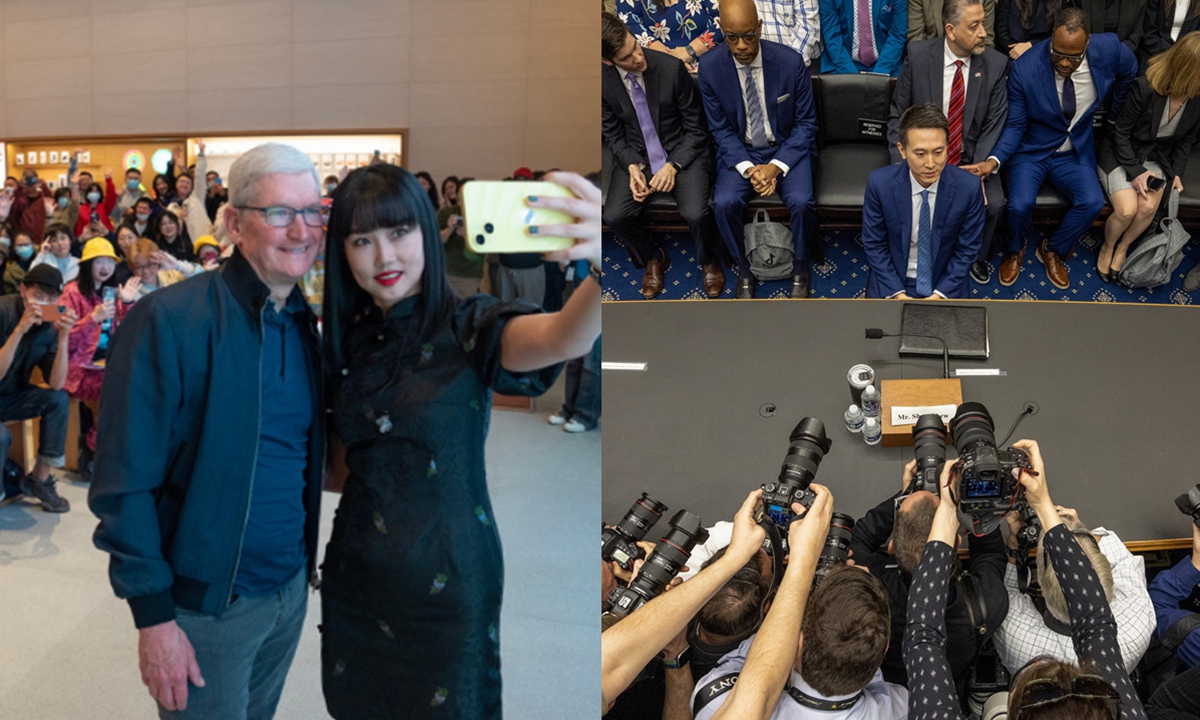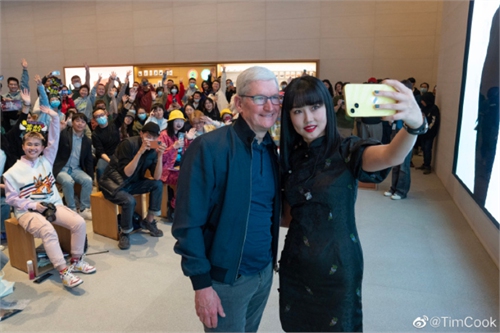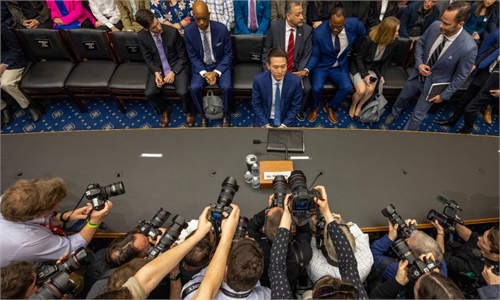
Stark contrast of two events shows China's opening-up. Photo: GT
Two events that took place almost simultaneously in Washington on March 23 local time and Beijing on March 24 had completely opposite implications. In Washington, an aggressive grueling congressional hearing that lasted more than five hours was held for TikTok, going through the process for the "complete suppression" of the multinational tech company based in Singapore and Los Angeles, but with a parent company in China.Meanwhile, on the other side of the world, Apple's CEO Tim Cook came to China for the first time in three years to attend the China Development Forum. He was warmly welcomed by the Chinese government and the Chinese people, along with the heads of many other industry leading companies of Fortune 500 attending the forum.
The contrast between the two events is stark and dramatic, as China's insistence on promoting a high level of openness to the world is firm and confident compared to the US' increasingly visible tendency of closure.
At the hearing held at the House Energy and Commerce Committee, US lawmakers asked more than 200 questions, the vast majority of which were chop logic and lacked even basic knowledge about the internet. Many lawmakers often interrupted TikTok's CEO, Shou Zi Chew at any time, not allowing him time to give answers based on facts, and only forcing him to answer "yes" or "no" to questions about specific issues. The majority of lawmakers neither "listened" nor "proved," but only competed to show "political correctness" and biased preconceptions.
Do the reasons for banning TikTok hold water? As some lawmakers pointed out, every accusation attributed to TikTok's data collection can be used against large domestic tech companies in the US, but the US has never before banned social media from operating within the US. Why do lawmakers launch crusade against TikTok without criticizing other companies that operate in the same way? The Biden administration accused TikTok of posing a threat to US data security, but could not provide evidence. According to the principle of the presumption of innocence in the common law system, the charges are not established until there is evidence. But why did it work in the case of TikTok? According to the First Amendment to the US Constitution, the ban on TikTok by US Congress may even be unconstitutional.
The US side has provided no evidence to support its allegation, yet it has been abusing its state power to block and suppress the company concerned. This seriously violates the principles of market economy and fair competition, of which the US claims itself to be a champion. This is a classic example of US hegemonism. The US is hurting not just the interests of the company and the American people, but also its reputation as a nation and international investors' confidence in the US business environment. Under the headline "The US Is Scaring off Foreign Investors," Barron's noted that the hearing has shaken global investor confidence to its core.
From the groundless suppression launched by the US government and lawmakers against TikTok, people have realized what "rules" truly mean when the US touts about "rules-based international order."
First, it is increasingly away from its own claims of a free market economy and fair competition. A legally operating private company was attacked in the US by the mighty power of the government, a slap in the face for their claim that "the US respects private enterprises."
Second, it is a violation of multilateral trade rules. The essence of WTO-centered multilateral trade rules is unconditional and non-discriminatory treatment, with businesses from all economies being treated equally. The White House and the Congress have unabashedly made a strict distinction between US-based businesses and those based in foreign countries with differentiated standards and policies. The former are fostered, while the latter are suppressed.
Third, it is a further deviation from normal international cooperation. The Cold War mentality and the narrative of big power confrontation have led to Washington's hysterical crackdown on China-related businesses. Lines are even being drawn entirely based on ideology, and blocs are being set one against the other. It has caused serious shocks and disruptions to normal international trade, investment and business, as well as major disruptions to global supply chains.
These three points show that the US is no longer in a position to talk about rules.
Actions with generalized security concept and trade protectionism can only lead a country to closure, to lose more and more competitiveness, and let the global recovery go astray. China knows this well and has stuck to the fundamental state policy of opening-up. This is particularly evident during the China Development Forum and the Boao Forum for Asia.
Recently, the secretary of the Shanghai Municipal Committee of the Communist Party of China Chen Jining, head of the National Development and Reform Commission Zheng Shanjie and Minister of Commerce Wang Wentao met with executives of the world's top 500 companies. They made it clear that China is firmly pushing forward a high level of opening-up, steadily expand institutional opening-up with regard to rules, regulations, management, and standards, and is willing to provide a good environment and services for foreign enterprises including Apple.
At the same time, investors from the US, Europe, Asia and other parts of the world came in droves, unanimously optimistic about the prospect of investment in China. Cook said his company and China have developed together through a "symbiotic relationship." The chairmen of Qualcomm China and Intel China have both said they will have closer cooperation with Chinese partners.
It can be seen that the China Development Forum and the Boao Forum for Asia are sending clear signals that China will never close its doors, take sides, divide the world into two camps, or change its determination to cooperate with the world. The 2023 Government Work Report has identified "intensifying efforts to attract and utilize foreign investment," "improving services for foreign-funded companies and facilitating the launch of landmark foreign-funded projects," and the Ministry of Commerce will also launch events for "Invest in China Year" in 2023.
Openness is competitiveness. An open market with unlimited potential in China that strictly adheres to the principle of non-discrimination is bound to be a pool for global capital, while those who gnash their teeth on Capitol Hill will only lament.
The author is a senior research fellow with the Center for China and Globalization. opinion@globaltimes.com.cn


